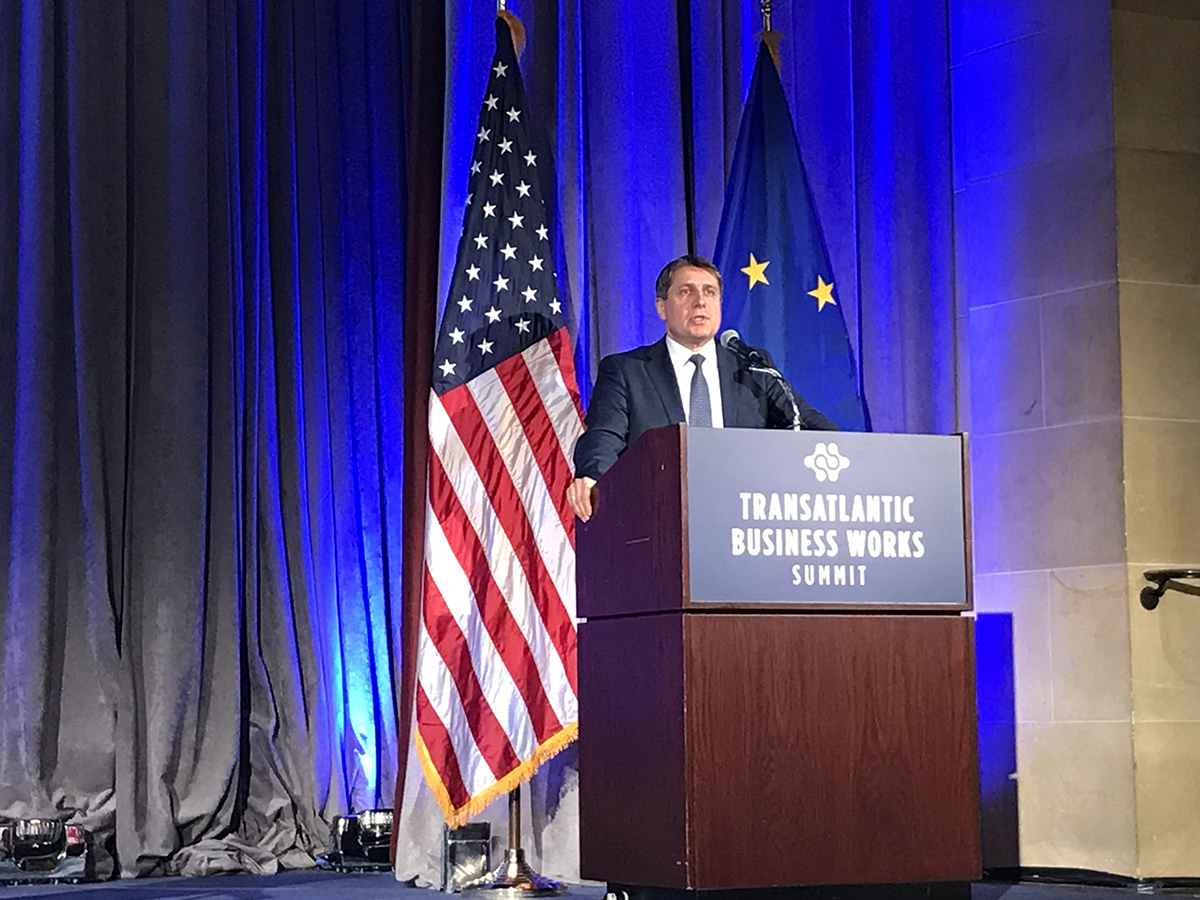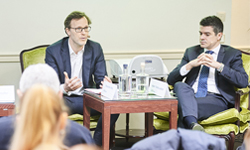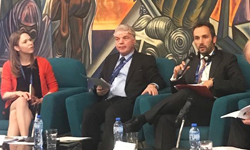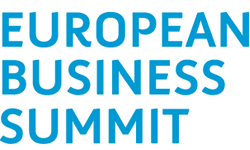BusinessEurope Headlines No. 2018-16
U.S. duties: extension of EU’s temporary exemption is positive, but business needs predictability

The U.S. Administration announced on 30 April that the EU’s temporary exemption from the decision to impose 25% additional duties on steel and 10% on aluminium, will be extended until 1 June. Commenting on the decision Markus J. Beyrer, Director General of BusinessEurope, said: “We consider this decision as positive but not enough for business. We still hope that at the end the U.S. will recognise the EU as its natural ally in addressing overcapacity on steel and aluminium by granting a permanent exemption.” When asked about the next steps, Beyrer added: “Business needs predictability and stability. We call on the European Union and Member States to continue to do their outmost to ensure a permanent exclusion will be granted. A good and lasting solution will allow the Transatlantic relation to power ahead and work on the basis of a positive agenda for growth and jobs. In parallel the EU should ensure that its rights will be legally protected according to WTO rules.”
![]() Contact: Luisa Santos
Contact: Luisa Santos
Our comment
Encouraging access to social protection: an important issue in the changing world of work
By Rebekah Smith, Deputy-Director for Social Affairs
 On 13 March, the European Commission published a proposal for a Council Recommendation on access to social protection for workers and the self-employed. This was part of the Commission’s ‘Social Fairness Package’ which is one of the initiatives to implement the European Pillar of Social Rights. This week BusinessEurope presented its views on the proposed recommendation.
On 13 March, the European Commission published a proposal for a Council Recommendation on access to social protection for workers and the self-employed. This was part of the Commission’s ‘Social Fairness Package’ which is one of the initiatives to implement the European Pillar of Social Rights. This week BusinessEurope presented its views on the proposed recommendation.
We all see that the world of work is changing and one example of this is the increasing variety of forms of employment. This can bring benefits for employers, workers and jobseekers alike, in terms of more professionnal opportunities and in particular for those entering the labour market for the first time. Ensuring access to social protection in a financially sustainable way is important to ensure that we can accompany these changes in the labour market. That’s why we support the Commission’s aim to encourage member states to allow all individuals in employment and self-employment to adhere to corresponding social protection. It’s important that this is done in a balanced way, which does not stifle innovation in the world of work nor in business models. And the recommendation must not lead to action at national level which deters employers, workers and individuals from using diverse contract forms, becoming self-employed, transiting between or combining different forms of work.
It’s particularly important to make sure that any action taken does not harm the sustainability of national social protection systems and respects the division of competences between EU and national levels, and the role of social partners. This means that the non-binding approach proposed by the Commission, with monitoring through the European Semester process is the right one. Also, the recommendation needs to leave the space to member states to decide whether and, if so, how to extend coverage, to which groups of workers, and which branches of social protection. The situation in each member state is very different, due to the history, traditions and principles which underlie their social protection systems. And of course the situation of different types of workers and the self-employed are also not the same. That’s why we insist that the definition of worker is left to the national level.
It’s also important that self-employed are formally covered for social risks they may be faced with (e.g. lack of income in old-age) and that they contribute in an appropriate way. Otherwise, this can lead to a reliance on social assistance financed by taxes without the necessary contribution base. However, self-employed should be able to choose the branches of social protection for which they want coverage and the type of insurance, provider and scheme which best corresponds to their situation.
There is work to do on the draft council recommendation to bring it in line with these aspects. And we will continue to contribute to the discussions with the EU institutions. If it’s drafted and implemented in the right way, this initiative could be useful in providing support for further reforms of social protection systems, combining sustainability and adequacy, and for mutual learning between member states. The key will be to allow for this targeted approach, which takes account of legitimate differences and can accompany the changes we experience on the labour markets successfully.
Contact: Rebekah Smith
Managing the energy transition
 “The large range of technologies we have at hand to help us reduce emissions gives Europe flexibility and resilience and it also provides the market with the possibility to select the optimal solution for every sector”, said Alexandre Affre, Director for Industrial Affairs, at the Brussels Net@work event, organised by the Martens Centre in Brussels on 26 April. Together with Isaac Valero, Member in the Cabinet of European Commissioner Miguel Arias Cañete and Christian Egenhofer, from the Centre for European Policy Studies (CEPS), he discussed the impact of the energy transition on EU competitiveness during a session hosted by the Foundation for Social Studies and Analysis (FAES). Affre cited the importance of keeping the transition cost-effective, as well as the need for policy coherence and the huge amount of investments needed as some of the key challenges to make the transition successful.
“The large range of technologies we have at hand to help us reduce emissions gives Europe flexibility and resilience and it also provides the market with the possibility to select the optimal solution for every sector”, said Alexandre Affre, Director for Industrial Affairs, at the Brussels Net@work event, organised by the Martens Centre in Brussels on 26 April. Together with Isaac Valero, Member in the Cabinet of European Commissioner Miguel Arias Cañete and Christian Egenhofer, from the Centre for European Policy Studies (CEPS), he discussed the impact of the energy transition on EU competitiveness during a session hosted by the Foundation for Social Studies and Analysis (FAES). Affre cited the importance of keeping the transition cost-effective, as well as the need for policy coherence and the huge amount of investments needed as some of the key challenges to make the transition successful.
Contact: Alexandre Affre
Photo copyright: David Plas Photography
New deal for consumers reality check
 Business, institutional, academic and consumer stakeholders sat together for the first time to discuss the recently proposed New Deal for Consumers in a conference organised by the Bulgarian Presidency in Sofia on 30 April. BusinessEurope Director for Legal Affairs Pedro Oliveira highlighted that the apparent shift from public to private enforcement in the EU with the introduction of judicial collective redress is a worrying development. “Litigation remains a slow, costly and complex mean of redress, often bringing more benefits to law firms than to consumers”, he stated, adding that other proposals of the package seem to invert the approach of full harmonisation of EU consumer law of the last 10 years, bringing back unnecessary legal fragmentation.
Business, institutional, academic and consumer stakeholders sat together for the first time to discuss the recently proposed New Deal for Consumers in a conference organised by the Bulgarian Presidency in Sofia on 30 April. BusinessEurope Director for Legal Affairs Pedro Oliveira highlighted that the apparent shift from public to private enforcement in the EU with the introduction of judicial collective redress is a worrying development. “Litigation remains a slow, costly and complex mean of redress, often bringing more benefits to law firms than to consumers”, he stated, adding that other proposals of the package seem to invert the approach of full harmonisation of EU consumer law of the last 10 years, bringing back unnecessary legal fragmentation.
Contact: Pedro Oliveira
Revision of SME definition: don’t artificially deprive companies from SME status
 Within BusinessEurope, there is a very broad consensus that the basic structure of the current definition for small and medium-sized enterprises (SME) in the EU (dating from 2003) is still adequate as a framing concept for developing the EU SME policy. But there is strong and unanimous concern that some technical provisions in the definition artificially deprive some companies from the SME status, which generates detrimental consequences for them. This should be remedied. This is the main message that Markus J. Beyrer, Director General of BusinessEurope, developed in a letter and a position paper sent to Elżbieta Bieńkowska, European Commissioner for the Internal Market, Industry, Entrepreneurship and SMEs, in the context of the European Commission consultation on the revision of the SME definition. For instance, an SME will typically lose its SME status when it gets financed by a venture capital fund taking a majority participation in it. As a consequence, this SME cannot apply anymore for attractive national or EU financial instruments making reference to the EU SME definition. This can affect the SME growth prospects and should be remedied.
Within BusinessEurope, there is a very broad consensus that the basic structure of the current definition for small and medium-sized enterprises (SME) in the EU (dating from 2003) is still adequate as a framing concept for developing the EU SME policy. But there is strong and unanimous concern that some technical provisions in the definition artificially deprive some companies from the SME status, which generates detrimental consequences for them. This should be remedied. This is the main message that Markus J. Beyrer, Director General of BusinessEurope, developed in a letter and a position paper sent to Elżbieta Bieńkowska, European Commissioner for the Internal Market, Industry, Entrepreneurship and SMEs, in the context of the European Commission consultation on the revision of the SME definition. For instance, an SME will typically lose its SME status when it gets financed by a venture capital fund taking a majority participation in it. As a consequence, this SME cannot apply anymore for attractive national or EU financial instruments making reference to the EU SME definition. This can affect the SME growth prospects and should be remedied.
![]() Contact: Daniel Cloquet
Contact: Daniel Cloquet
European Business Summit: What is the future of Europe as a global player?
 The world is undergoing a profound, multidimensional transformation. We are entering a new international era with profound changes in the global order, new power relations, new challenges to existing multilateral institutions. The upcoming edition of the European Business Summit on 23-24 May in Brussels will look at Europe’s place in this process. What is the future of Europe as a global player? What trade opportunities are there in an uncertain environment? How can the EU open up to new markets while safeguarding its standards and the interests of its citizens? How can industry be part of the solution by promoting clean and inclusive growth, contribute to the achievement of Sustainable Development Goals and strengthen the position of gender equality in business? How can Europe be competitive and innovative whilst positioning itself as a digital global norm-setter? And: how to transform Europe’s economy in the age of digitalisation? Europe has everything it needs to become the leader of this global transformation. The debates of the Summit will benefit from the expertise of world-class speakers: high-level politicians, including EU Commissioners, Director-Generals of major companies, other business leaders and academic researchers. See the programme, register here, join the debate and shape Europe’s future global role!
The world is undergoing a profound, multidimensional transformation. We are entering a new international era with profound changes in the global order, new power relations, new challenges to existing multilateral institutions. The upcoming edition of the European Business Summit on 23-24 May in Brussels will look at Europe’s place in this process. What is the future of Europe as a global player? What trade opportunities are there in an uncertain environment? How can the EU open up to new markets while safeguarding its standards and the interests of its citizens? How can industry be part of the solution by promoting clean and inclusive growth, contribute to the achievement of Sustainable Development Goals and strengthen the position of gender equality in business? How can Europe be competitive and innovative whilst positioning itself as a digital global norm-setter? And: how to transform Europe’s economy in the age of digitalisation? Europe has everything it needs to become the leader of this global transformation. The debates of the Summit will benefit from the expertise of world-class speakers: high-level politicians, including EU Commissioners, Director-Generals of major companies, other business leaders and academic researchers. See the programme, register here, join the debate and shape Europe’s future global role!
Contact: Joanna Nowak
Calendar
- 9 May: Europe Day
- 12 May: U.S. decision on Iran nuclear deal
- 16 May: Energy Union - Climate Package
- 16 May: 3rd Mobility Package
- 16 May: 2nd Education Package